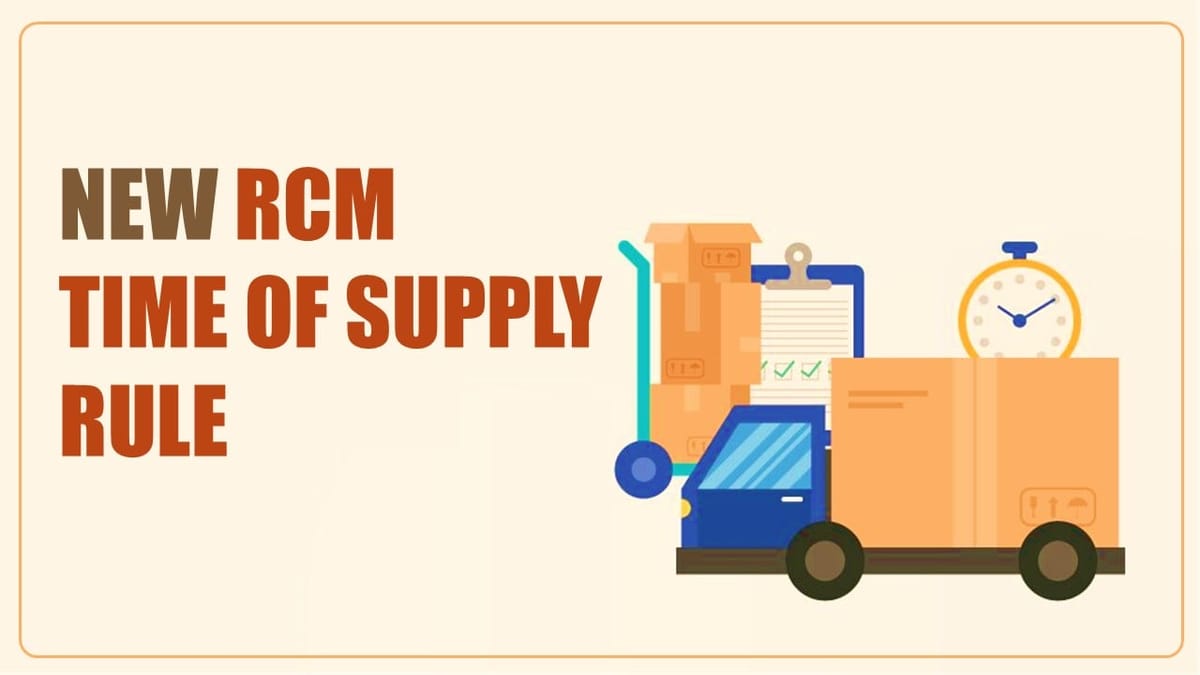New RCM Time of Supply Rules came into effect from 1st Nov 2024; Know About the Rule
The GST landscape of India is experiencing a major change with the implementation of the new Reverse Charge Mechanism (RCM) Time of Supply Rules on November 1, 2024.
This move requires self-invoicing for RCM transactions, which is a vital step that businesses must follow. Delays in issuing may result in the loss of input tax credit (ITC) and penalties under the CGST Act, as outlined in the Finance (No. 2) Act, 2024.
In addition, a new Rule 47A has been implemented, which requires self-invoices to be generated within 30 days after receiving the goods or services. The time of supply for RCM will be decided by either the payment date, the date of invoice issue, or the date of receipt, with penalties for late invoicing or tax payments.
Here’s a detailed look at what these new rules involve and how they affect businesses.
What is Reverse Charge Mechanism (RCM)?
Before getting into the new rules, it’s important to understand RCM. The Reverse Charge Mechanism is where the liability to pay tax is shifted from the supplier to the recipient of goods or services. This approach is often used when the supplier is not registered under GST or when the government has notified them of specific goods and services.
New RCM Time of Supply Rules
Self-invoicing for RCM transactions will be mandatory beginning November 1, 2024. This means that the recipient of goods or services under RCM must generate an invoice on behalf of the supplier. This self-invoicing method is essential for obtaining Input Tax Credit (ITC) and complying with GST requirements.
Key Highlights of the New Rules
- Every RCM transaction requires the recipient to generate an invoice. This invoice must include all of the details required by GST regulations.
- The time of supply under RCM determines when the tax liability is incurred. To ensure compliance and prevent penalties, the self-invoice must be issued immediately.
- Delays in issuing the self-invoice may result in a loss of ITC. Businesses must issue invoices on time to collect ITC and prevent financial consequences.
- Non-compliance with the new requirements may result in penalties under the CGST Act. Ensuring compliance with the rules is critical to avoiding additional costs and legal difficulties.
Effect on Businesses
- The implementation of mandated self-invoicing under RCM has many implications for businesses:
- Businesses will need to dedicate their resources and time to creating self-invoices for each RCM transaction. This may necessitate modernizing their accounting systems and training employees to manage the new procedure effectively.
- Accurate and timely self-invoicing will be vital to GST compliance. To avoid penalties, businesses must maintain precise records and prepare for any audits.
- The possible loss of ITC owing to delays in self-invoicing might have an impact on a company’s cash flow and financial plans. Prompt invoice issues will be critical to preserving financial health.
- Businesses may need to modify their accounting and invoicing software to meet the new criteria. Automated solutions can help to streamline the process and lower the chance of errors.
How to be Prepared for this New Rule?
- Businesses must take proactive measures to prepare for the new RCM Time of Supply Rules:
- Familiarize yourself with the comprehensive guidelines and requirements for self-invoicing in RCM. Ensure that everyone on your team is properly informed and trained.
- Invest in reliable accounting and invoicing software that can handle self-invoicing effectively. Automation can help to minimize administrative burden while also improving accuracy.
- Conduct internal audits on a regular basis to ensure that the new rules are followed. To avoid penalties, identify any differences and correct them as soon as possible.
- Keep track of any further changes or clarification from the GST authorities. Regular upgrades can help you maintain compliance and avoid unexpected problems.
Conclusion
The new RCM Time of Supply Rules indicate a significant shift in India’s GST regime. By mandating self-invoicing for RCM transactions, the government hopes to improve compliance and streamline the tax system. Businesses must prepare thoroughly to adjust to these changes, including timely issuance of self-invoices to claim ITC and avoid penalties. Embracing automation and being educated will be critical for navigating this new regulatory landscape successfully.
StudyCafe Membership
Join StudyCafe Membership. For More details about Membership Click Join Membership Button
Join MembershipIn case of any Doubt regarding Membership you can mail us at [email protected]
Join Studycafe's WhatsApp Group or Telegram Channel for Latest Updates on Government Job, Sarkari Naukri, Private Jobs, Income Tax, GST, Companies Act, Judgements and CA, CS, ICWA, and MUCH MORE!"
